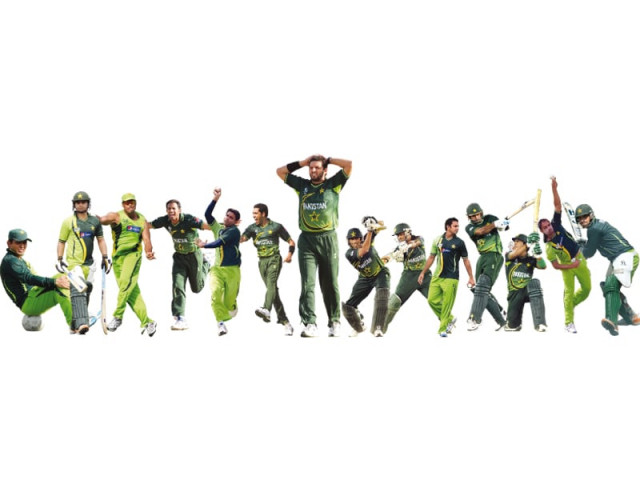The future is bright: Afridi
Captain satisfied with team’s show despite semi-final loss against India.

Defeated but not destroyed. Pakistan’s World Cup campaign grounded to a halt in Mohali but captain Shahid Afridi said the performance of his side’s younger players was among the positives, hoping the semi-final would be the catalyst for more games on Indian soil.
“I’m proud of my team, the boys have really done a great job in this competition,” said Afridi following Pakistan’s 29-run defeat at the hands of India. “We played as a unit and no-one was expecting us to play cricket like this so I’m very happy as a captain. I think the youngsters really performed well. Asad Shafiq and Umar Akmal played well and I hope they will do well in the future. I think we have played better than in the 2003 and 2007 World Cups.”
Good progress after torrid times
Pakistan cricket has been under a cloud since last year’s ‘spot-fixing’ scandal in England which led to bans for new-ball duo Mohammad Amir and Mohammad Asif as well as former Test captain Salman Butt.
“It has been a difficult 10 months for us. I’m thankful to my board officials and team management for backing me. We had a rickety team coming into the World Cup and considering that it has been a good performance.
Riaz made a difference, says Afridi
“We did not bowl well with the new ball, but because of Wahab Riaz’s impressive bowling we came back, otherwise I thought they would have scored about 300. It was a great bowling performance from him.”
Riaz was selected after Pakistan felt they could not risk fast-bowler Shoaib Akhtar, meaning there was no fairytale farewell for the ‘Rawalpindi Express’, who had said he would retire from international cricket after the World Cup.
Captain wants to play more in India
Pakistan have been unable to play matches at home since an armed attack on Sri Lanka’s team bus in Lahore in 2009. And now Afridi wants to see the restoration of normal cricket ties with India as part of his country’s sporting rehabilitation.
“We want to play in India, we have shown them our hospitality in the past, I hope they do so too.”
India’s total of 260 for nine was built on Sachin Tendulkar’s 85 but Pakistan did not help their cause by dropping the man-of-the-match four times. However, Afridi eventually held the chance that ensured his pre-match prediction that Wednesday would not be the day when Tendulkar scored his 100th international hundred came true.
“I want to congratulate the India team and the whole nation. I think they deserved to win. I think we made some big mistakes in fielding, we dropped some catches, like for Sachin. But like I told you, Sachin didn’t score a hundred.”
Ahmed Shehzad (1/10)
A tournament to forget for the opener. He failed when given a chance in the 2009 World Twenty20 and he failed again. Unable to replicate his domestic form in international cricket, Shehzad’s reluctance to learn from his mistakes may have drawn curtains on his career.
Kamran Akmal (4/10)
Missed catches and missed stumpings defined Kamran’s World Cup, as it has done for many tournaments and series before it. He did score over 200 runs in the tournament but his dismal work behind the stumps - against Sri Lanka and New Zealand - affected the team greatly.
Shoaib Akhtar (6/10)
He may have impressed all with his farewell speech but other than the beauty that was Mahela Jayawardene’s dismissal, the Rawalpindi Express failed to let off any steam. His presence in the greens will be sorely missed.
Wahab Riaz (7/10)
Riaz’s start-stop career may have finally launched courtesy a lack of options and a career-best haul against India. Providing variety and lots of outswing to the right-hander, Riaz’s attacking attitude is part-consolation following Mohammad Amir’s unavailability.
Abdul Razzaq (5/10)
He has neither remained Pakistan’s reliable all-rounder nor has the ability to provide regular breakthroughs with the ball. Razzaq’s position in the batting order, his place on the field while Pakistan bowl and the ideal time to bring him in are all major worries for the team management.
Umar Gul (7/10)
It’s not his accuracy with the ball that is the problem but his consistency. Gul, at his best, terrorised the opposition while doing magic with the white ball. But his lack of penetration in key matches resulted in Pakistan’s strike bowler left wicketless.
Shahid Afridi (8/10)
Afridi remained a defiant leader, scripting Pakistan’s wins with his bowling. His batting, as is the case on various occasions, left many questions unanswered and his puzzling decisions as well as the rigidness in sticking to the dressing-room plans did not help the team’s cause at times.
Younus Khan (5/10)
Younus’ days as a limited-overs player may be numbered. Unable to rotate strike at will, the pressure he creates for himself often leads to a false stroke and his downfall. Quick in the field, Younus is a safe pair of hands unless it’s a semi-final and a match-winner offers you a dolly.
Asad Shafiq (8/10)
Asad got inducted into the playing-eleven late in the tournament but shone almost every time he got a chance. A 78 on World Cup debut, 46 against the defending champions in a run-chase and a 30 in the semi-final ensured the youngster remains a key contender to replace the seniors in the coming days.
Saeed Ajmal (6/10)
Following a personal tragedy last year, Ajmal has lost out to Abdur Rehman as Pakistan’s first-choice spinner. He continues to bamboozle the best of the batsmen - when he is picked in the playing-eleven - but his inability to bat has become the wrong reason behind his omission.
M Hafeez (7/10)
Hafeez’s performance improves with age. He shared the new ball in crucial matches and opened the batting, giving the start that Pakistan required. He contained the opposition batsmen and flayed their bowlers, developing into an all-rounder the team yearned for.
Umar Akmal (7/10)
Eyebrows were raised as soon as Umar’s finger was seen bandaged after talks of Kamran’s omission were doing the rounds. Although losing the flamboyancy that launched his career, Umar has established an ideal blend of defence and attack that saw him score 240 runs in the World Cup.
Abdur Rehman (6/10)
Using Rehman defensively at the start of the innings was Pakistan’s mode of attack. While it contained the run-flow, Rehman was unable to get the breakthroughs via his flat trajectory and quicker-than-normal pace. A handy slogger and a useful fielder, Rehman performed as expected.
Misbahul Haq (6/10)
Termed Pakistan’s safest catcher, Misbah dropped Sachin Tendulkar in Mohali and while he remained the team’s highest scorer in the World Cup, his strange tactics against India in the run-chase raised eyebrows and questioned his place in the ODI team.
Pakistan’s top five
M Runs Highest
Misbahul Haq 8 248 83*
Umar Akmal 7 240 71
Mohammad Hafeez 8 215 61*
Kamran Akmal 8 207 55
Younus Khan 8 185 72
Pakistan’s top five
M W Best
Shahid Afridi 8 21 5-16
Umar Gul 8 14 3-30
Wahab Riaz 5 8 5-46
Mohammad Hafeez 8 8 2-16
Saeed Ajmal 3 5 2-18
Published in The Express Tribune, April 1st, 2011.



















COMMENTS
Comments are moderated and generally will be posted if they are on-topic and not abusive.
For more information, please see our Comments FAQ